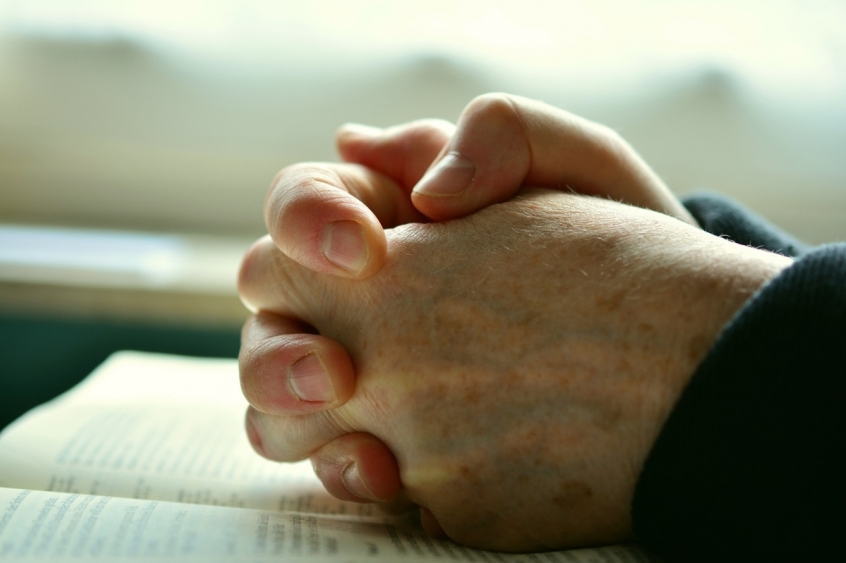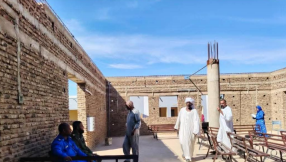There are many ways to pray: in church, at home, in nature, at work, on our knees, by our beds, at a kitchen table, in the car, with family, with friends, with strangers, alone. Our prayers may be simple or eloquent; they may be deeply personal or they may repeat the prayers of others, perhaps those of Jesus or the saints. But despite their many differences, most prayers involve words. Sometimes these words are planned, sometimes impromptu. Sometimes they are formal, sometimes colloquial. Sometimes they are accompanied with laughter, at other times with tears. Sometimes the words we use to pray echo through the ages, at other times they are fresh and new. Sometimes we have to work hard to find the right word, at other times they rush in abundantly.
But what happens when you have a desire to pray but you have no words with which to pray?

I have experienced this dilemma many times. Indeed, the times when I have most felt the desire to pray have also been the times when words have felt too small, too hollow, too empty. Times when I have been overwhelmed with emotion, with grief or joy; times when I have been suddenly startled out of self-preoccupation by a beautiful sunset or flower; times when I feel my mind is too full with anxiety; times when I feel hopeless and depressed. At these times it is a struggle to pray because words seem either insufficient or too much work. At these times I feel the pull to be, to rest in God but I can find no words to allow me to do this.
I spent most of my life believing that these times are a test of my faithfulness or desire to please God. Would I push through and commit my mental energy to finding the words to say something to God or would I ignore the urge and carry on with my day? More recently, I've come to realise that both responses are misguided and that I had actually a missed a key fact about prayer. Prayer is not just talking to God but also listening to God, not just with our ears but with our whole being. It is not something we simply do but something that we open ourselves up to receive.
Prayer is a gift: an invitation to let go of everything that is false or fleeting and reorient ourselves to him who is the source of all being and love. God does not depend upon our prayers but he delights in them, much like a parent delights in the freely given affection of her children. And much like these tender moments between parent and child, our prayer life does not require words.
Looked at through this lens, those times when we feel an urge to pray but have no words cease to indicate failure but instead are a sign of blessing. When we are overwhelmed with joy or grief, or when we are surprised by indescribable beauty or when our minds are crowded with anxious thoughts, the experience of a nudge to pray is the Spirit inviting us to be present with God. If we try to use words at these times our prayer will be impeded. We need to rest in God and trust that Jesus praying for us, always, not necessarily with words but as the Word. Thomas Merton, one of the great modern contemplatives, explains this beautifully:
'It is a risky thing to pray, and the danger is that our prayers get between God and us. The great thing in prayer is not to pray, but to go directly to God. If saying your prayers is an obstacle to prayer, cut it out! Let Jesus pray. Thank God Jesus is praying. Forget yourself. Enter into the prayer of Jesus. Let him pray in you... The best way to pray is: stop! Let prayer pray within you, whether you know it or not. This means a deep awareness of our true identity... (that) by grace we are Christ. Our relationship with God is that of Christ to the Father in the Spirit.'
As a society we are used to thinking of silence as a lack, a void to be avoided with whatever distraction is most appealing: small talk, music, TV, social media. Or perhaps we think of silence as a means to an end, an empty receptacle into which something may be placed. Often this is how we experience silent prayer in church. We sit in silence as a way to prepare for the 'real' prayer that comes through words. Or we sit in silence waiting for God to say something, to give us a vision or place words in our hearts.
But sometimes silence is not a void and not a waiting but is its own 'event' and has its own fullness. We may be fortunate enough to recognise this experience from being with true friends: the ones we can simply sit with in silence, communicating in a language of loving presence, too deep for words. Similarly, when we allow our prayer to be a full silence, neither avoiding it nor waiting for it to be filled, we deepen our friendship with God. We let go of our conscious self and enter a place where we are held and known and loved.
Even if we can accept that silence can be a deep form of prayer, how do we pray in silence? At first this seems obvious: you just stop talking! But anyone who's tried meditation will know how difficult it can be to quiet the mind. Even if we think we have no words with which to pray, there may be a lot of mental 'noise' when we try to be obedient to the Spirit's gentle nudge and bring ourselves into God's presence. It is very hard to let go and simply be.
Fortunately, much has been written on silent, contemplative prayer – also known as the prayer of the heart – and several insights recur including the value of sitting in a comfortable upright position, using a simple opening phrase to direct our thoughts to God ('I'm here, Lord') and a sacred word or phrase to help us return to him when thoughts begin to entangle or overwhelm us (eg Abba, love, peace, let go).
But while these insights are sage and helpful, it is important that wordless prayer does not become governed by rules and expectations or that we begin to sneer at prayer with words as a lesser, more shallow form of prayer. There will be times when extended silent prayer is either impossible or inappropriate. I have small children and I often experience the nudge to be still when I am with them, perhaps on a walk or while at play or during bathtime. At these times I am unable to adopt the 'correct' posture or be quiet longer than a minute. At other times I have felt the nudge when cooking dinner or drinking a cup of tea and the motion of stirring or sipping becomes part of my wordless prayer.
Something else I have noticed is that silent prayer often flows from, or is followed by word-filled prayer. While there is truth in St John of the Cross' statement, 'Silence is God's first language,' this does not mean that God will not meet us in whatever language we have to offer. In all our prayer we must remember that what is important is not what we do or how we do it but the very movement of turning to God whenever we feel his nudge and that we learn to rest in him.
'In returning and rest you shall be saved; in quietness and trust shall be your strength' (Isaiah 30:15).
Jennifer Goodyer is a writer and artist living in Chicago. Follow her on Twitter @goodyerjen













